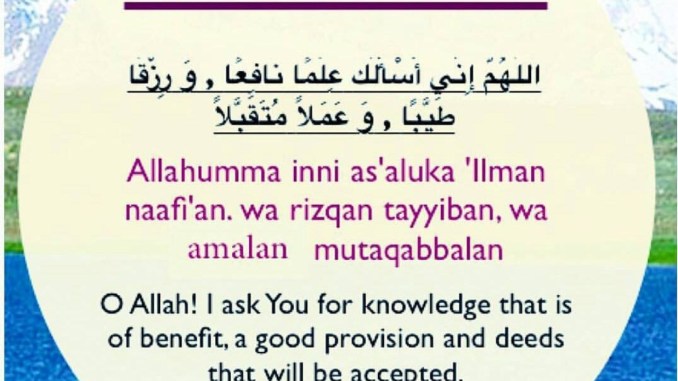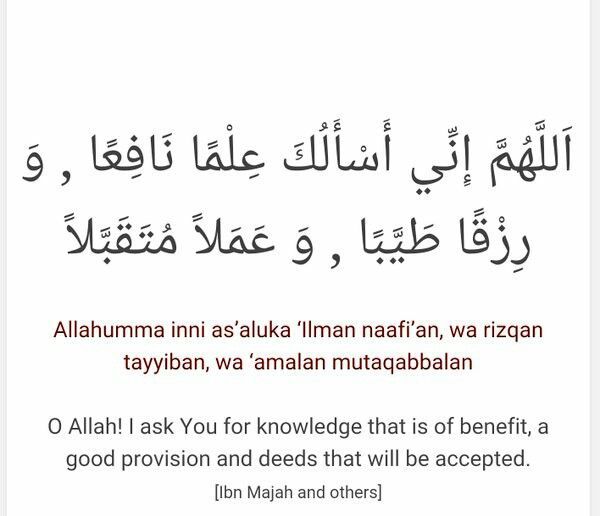
Many of us make dua to Allah to ask for His favors, to get His attention, to seek forgiveness for our sins, or simply to get out of trouble when we get into one. Sometimes our dua to Allah brings immediate results and sometimes it doesn’t. For those of us who fully comprehend the dynamics behind dua, the process can be straightforward and less stressful, but for others who don’t understand it as such, the lack of results as we perceive them to be, sometimes can cast doubt on our faiths.
In the saheeh Sunnah there is no known prayer specifically for asking for increased provision. The Duas that some website claims to increase and Rizq are not proven by any authentic hadeeth except no 5 (read below). However Quran and Hadeeth mentions some of the Amal that can help in increasing our Rizq and Provision.
1 : Stop Sinning
Sins deprive a person of provision (rizq) in this life. In Musnad Ahmad it is narrated that Thawbaan said: “The Messenger of Allah (SAWS) said: ‘A man is deprived of provision because of the sins that he commits.’” (Narrated by Ibn Maajah, 4022, classed as hasan by al-Albaani in Saheeh Ibn Maajah)
So, we can easily see that by engaging in sins, we are not only making the prospects of our afterlife (integral part of Islamic faith) bleak but sins can greatly and actively contribute to the difficulties of our daily lives. Allah says (interpretation of the meaning): “Whatever of good reaches you, is from Allah, but whatever of evil befalls you, is from yourself…” [al-Nisa’ 4:79] Whether we encounter challenges in earning a living, in our family affairs, or other matters of life, the burden of sins greatly inhibits us from seeking the ultimate blessings of Allah and to have the potential of leading a good life in this world and the hereafter.
2 : Believe in Qadr – Say Alhumdulillah
The Provision of a Child is written while he is still in his mother’s womb. This is evident from the hadeeth-
Narrated Anas bin Malik: The Prophet said, “At every womb Allah appoints an angel who says, ‘O Lord! A drop of semen, O Lord! A clot. O Lord! A little lump of flesh.” Then if Allah wishes (to complete) its creation, the angel asks, (O Lord!) Will it be a male or female, a wretched or a blessed, and how much will his provision be? And what will his age be?’ So all that is written while the child is still in the mother’s womb.” (Bukhari, Hadith 315)
We do not know any specific surah in the Quran which is proven in any (sound) report to bring provision and make it easy to earn a living, but fearing Allah (taqwa) in general — which includes reading and pondering the Quran — is one of the means prescribed in sharee‘ah to bring provision. At the same time it is essential to take appropriate physical measures and rely on Allah in one’s heart to make things easier. wazifa for getting good job ,strong wajifa for job , Wajifa to get job in 3 days , powerful dua for job ,dua to get job immediately ,
3. Make Dua
Dua is Ibadah . It is having the belief that Allah is the sustainer .Allah loves his slave who makes Dua .So we should ask only from Allah .
Allah says in the Quran (interpretation of the meaning): “Say (O Muhammad (SAW) to the disbelievers): My Lord pays attention to you only because of your invocation to Him…” [Surah AlFurqaan, 25:77] 4.2 Dua is considered as an act of worship The Prophet (SAW) said: “Dua is worship.”
Not making Dua makes Allah angry The Prophet (SAW) said: “Whoever does not ask of Allah, He becomes angry with him.” [Classed as hasan by Al-Albaani. Saheeh Sunan AlTirmidhi, 2686] We therefore should not wait to build that relationship with Allah that one can build through the channel of Dua. We should ask Allah often, even if it’s just forgiveness for our sins and thanking Him for his bounties.
In a hadith it says: “The decree cannot be overturned except by dua.” [Fataawa Noor ‘ala al-Darb by Shaykh Ibn ‘Uthaymeen (may Allah have mercy on him)] Shaykh Al-Islam Ibn Taymiyah said in Majmoo’ Al-Fataawa [8/69]:
If a person says that he does not say dua or ask of Allah, because he relies on the divine decree, he is also erring, because Allah has made dua and asking means of attaining His forgiveness, mercy, guidance, support and provision. If good is decreed for a person he will attain by means of dua what he cannot attain without dua. What Allah has decreed and knows with regard to His slaves’ circumstances and destinies is only decreed on the basis of means, and decrees will be fulfilled at the appointed times. There is everything that happens in this world or in the Hereafter happens on the basis of cause and effect; Allah is the Creator of both cause and effect. Disregarding the principle of cause and effect is contrary to reason.
4. Have Taqwa and fear Allah
Allah says in Quran tat we should always be mindful of Allah swt and should not do anything that Angers Allah swt and if we are doing such things we should make Astaghfar.
“And whoever fears Allah – He will make for him a way out And will provide for him from where he does not expect.” (Quran, Surah Talaq: 2-3)
5. Do Astaghfar
I [Nooh] said (to them): ‘Ask forgiveness from your Lord, verily, He is Oft‑Forgiving;
‘He will send rain to you in abundance,
‘And give you increase in wealth and children, and bestow on you gardens and bestow on you rivers” [71:10-12].
And Allah says (interpretation of the meaning):
“And (commanding you): “Seek the forgiveness of your Lord, and turn to Him in repentance, that He may grant you good enjoyment, for a term appointed, and bestow His abounding grace to every owner of grace (i.e. the one who helps and serves the needy and deserving, physically and with his wealth, and even with good words). But if you turn away, then I fear for you the torment of a Great Day (i.e. the Day of Resurrection)” [11:3].
Hence al-‘Allamah Ibn al-Qayyim (may Allah have mercy on him) mentioned istighfar (seeking forgiveness) in the eighteenth chapter of his book al-Wabil al-Sayyib among the adhkar (words of remembrance) that bring provision and ward off difficulty and hardship.
6. Make Dua during Fajr Salah- Read this Dua

Narrated from Umm Salamah (RA) that the Prophet (Peace of be upon Him) used to say after Fajr prayer:
“Allahumma inni as aluka rizqan tayyiban wa ‘ilman naafi‘an wa ‘amalan mutaqabbalan
(O Allah, I ask You for a good (halal) provision, beneficial knowledge and accepted deeds).” [Ahmad, Ibn Maajah]
7. Make Dua in Prostration
The Prophet (SAW) said: “The closest that any one of you may be to his Lord is when he is prostrating, so say a lot of dua at that time.” [Narrated by Muslim, 482, from the hadith of Abu Hurayrah]
Another narration says: Ibn Abi Shaybah narrated in Al-Musannaf [1/331] that Al-Hasan and Al-Sha’bi said: “Ask during your prayer for whatever you want.”
8. Face Qibla while making Dua
Facing toward the qiblah (Kaaba) is another position that one should strive to take when making dua. Umar ibn Al-Khattaab (RA) said: On the day of Badr, the Messenger of Allah (SAW) looked at the mushrikeen, who were one thousand strong, and his companions numbered three hundred and nineteen. Then the Prophet of Allah (SAW) turned to face the qiblah, then he stretched forth his hands and started to cry out to his Lord: “O Allah, grant me what You have promised me, O Allah, give me what You have promised me. O Allah, if this small band of Muslims perishes, You will not be worshipped on earth.” He kept on crying out to his Lord, stretching forth his hands, facing towards the qiblah, until his cloak fell from his shoulders… [Narrated by Muslim, 1763]
9.Make Dua between Adhan and Iqamah
It is narrated in a Saheeh report that the Prophet (SAW) said: “A dua offered between the adhaan and iqaamah is not rejected.” [Narrated by Abu Dawood, 521; Al-Tirmidhi, 212. See Also Saheeh Al-Jaami’, 2408]
10.Give a great deal of charity
Allah, may He be exalted, says (interpretation of the meaning):
“Say: Truly, my Lord enlarges the provision for whom He wills of His slaves, and (also) restricts (it) for him, and whatsoever you spend of anything (in Allah’s Cause), He will replace it. And He is the Best of providers”[Saba’ 34:39].
Muslim (2588) narrated from Abu Hurayrah (may Allah be pleased with him) that the Messenger of Allah (blessings and peace of Allah be upon him) said: “Charity does not decrease wealth.”
An-Nawawi (may Allah have mercy on him) said:
They (the scholars) mentioned two meanings of this hadeeth, one of which is that (the wealth) will be blessed (as a result of giving charity) and harm will be warded off from it, so the apparent decrease will be compensated for by means of hidden blessing (barakah). This is something that is well known from experience. The second is that even if it appears to be decreased outwardly, there will be compensation for that in the reward that results from it, and it will be increased manifold.

Comments
Post a Comment